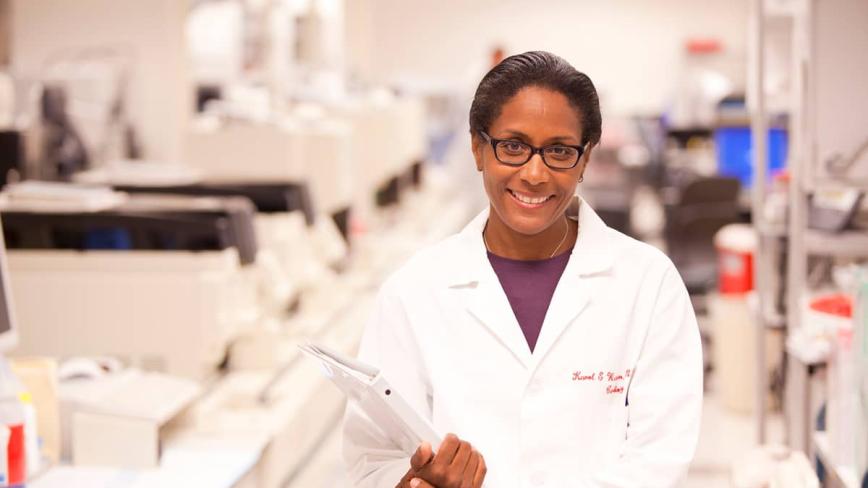Clinical trials are research studies used to find new treatments. They help researchers answer important questions about each potential treatment, such as:
- Is it safe?
- Does it work?
- Is it better than the treatments we already have?
- Does it benefit some patients more than others — and, if so, why?
New treatments can only be made widely available after clinical trials show they are safe and effective.
Of course, not all clinical trials result in effective new treatments. But by volunteering to participate in a clinical trial at University of California Health (UCH), you can help science advance and get early access to experimental options.
Reasons to Join a Clinical Trial
There are many good reasons to enroll in clinical trials. People may join a clinical trial to:
- Help advance science and find new treatments
- Help people in the future who may be affected by the same condition
- Receive experimental options early, before they may be widely available
- Try experimental options when approved treatments don’t work or have too many side effects for them

Who Can Join a Clinical Trial?
Each clinical trial has different rules about who can join. The rules are called eligibility criteria.
Trials have eligibility criteria to make sure they provide the specific answers researchers are looking for. For example, researchers may want to study whether a drug works for people with a specific stage of a specific type of cancer. In that case, only people with that stage and type of cancer will be able to participate in the trial.
Some clinical trials include healthy volunteers — people with no known significant health problem.
Each clinical trial listing in
Diversity and Inclusion in Clinical Trials
UCH is committed to diversity and inclusion in clinical trials. We believe that the people participating in each trial should resemble the people the potential treatment is meant to help.
We’re constantly working to ensure that we recruit clinical trial participants from all of California’s diverse populations.
Are Clinical Trials Safe?
At UCH, patient safety is the No. 1 priority for clinical trials staff.
Because researchers are still learning about the treatments they’re studying, no trial is without risk. But our researchers follow strict rules from the U.S. government that protect participants as much as possible.
Before you join any clinical trial, researchers will talk with you about any specific risks the trial may involve. If you ever decide you don’t want to participate anymore, you can leave a clinical trial at any time.

Informed Consent in Clinical Trials
Before you join a clinical trial, researchers are required to fully explain:
- What will be done to you
- Possible risks and side effects
- How the trial will work
- That participation is completely voluntary
You’ll also receive a document explaining all of this information. After you receive the information, you will be able to ask as many questions as you want until you fully understand it. Then you’ll sign a document acknowledging that you understand. This process is called informed consent.
Where Do Clinical Trials Happen?
UCH researchers run various clinical trials at the system’s academic health centers. You’ll usually go to the hospital or a doctor’s office to receive the treatment being studied.
You can search for a clinical trial at UCH by condition or location. Some clinical trials are available at a single location, while others are available at multiple locations. All clinical trial listings include information about where the trial is taking place. Once you find a trial that interests you, you can contact the participating locations.
Clinical Trials Costs and Payment
Typically, when you participate in a clinical trial, you do not pay for the care you receive as part of the trial. However, your health insurance provider may be billed for some of the care you receive during the trial. This varies by trial and the researcher will discuss the details with you.
In some cases, you may receive a small payment (a stipend) to help with transportation or other costs related to the trial. The researcher will discuss this with you.
Clinical Trial Phases
Clinical trials are conducted in phases. Researchers try to answer a different question in each phase:
Phase I: Is it safe?
The main goal of a Phase I study is to see if the treatment is safe. Phase I studies also may look at:
- Whether it works better to give a new drug by mouth, injection or another method
- How often a treatment should be given
- What specific doses are safe
A Phase I trial usually enrolls a small number of patients.
Phase II: Does it work?
Phase II trials only happen after a Phase I trial has shown that a treatment is safe. A Phase II trial looks at whether a treatment works as it’s supposed to. Researchers may also continue to evaluate the treatment’s safety.
Phase II studies usually have more participants than Phase I studies.
Phase III: Is it better than the treatments we already have?
If a Phase II trial shows that the treatment works, the next step is a Phase III trial. Phase III trials compare the new treatment with a current treatment to see which is safer and works better.
Phase III trials often enroll large numbers of people, sometimes thousands.
If a Phase III study shows that a treatment works and is safe, the U.S. Food and Drug Administration (FDA) reviews it for approval.
Phase IV: Does it have benefits or problems we don’t yet know about?
If the treatment is approved, researchers may do a Phase IV study. Phase IV studies look at whether the treatment could be used to treat other conditions. They might also look for long-term problems that may not have appeared before approval.
UCH Clinical Trials
Across UCH’s academic health centers, researchers are investigating treatments for over 2,400 conditions in more than 2,200 clinical trials currently enrolling participants. When you join a clinical trial at UCH, you can get early access to these experimental options.
UC Cancer Clinical Trials
The University of California (UC) Cancer Consortium is a collaboration among UC’s five Comprehensive Cancer Centers, which all hold the highest possible designation from the National Cancer Institute. Through the consortium, you can find clinical trials for virtually any kind of cancer.
